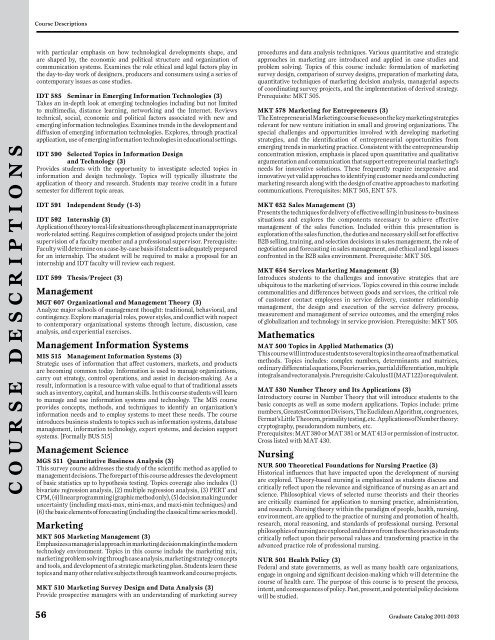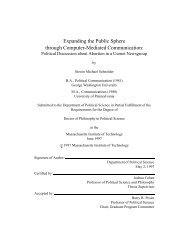COURSE DESCRIPTIONS - SUNY Institute of Technology
COURSE DESCRIPTIONS - SUNY Institute of Technology
COURSE DESCRIPTIONS - SUNY Institute of Technology
Create successful ePaper yourself
Turn your PDF publications into a flip-book with our unique Google optimized e-Paper software.
Course Descriptions<br />
<strong>COURSE</strong> <strong>DESCRIPTIONS</strong><br />
with particular emphasis on how technological developments shape, and<br />
are shaped by, the economic and political structure and organization <strong>of</strong><br />
communication systems. Examines the role ethical and legal factors play in<br />
the day-to-day work <strong>of</strong> designers, producers and consumers using a series <strong>of</strong><br />
contemporary issues as case studies.<br />
IDT 585 Seminar in Emerging Information Technologies (3)<br />
Takes an in-depth look at emerging technologies including but not limited<br />
to multimedia, distance learning, networking and the Internet. Reviews<br />
technical, social, economic and political factors associated with new and<br />
emerging information technologies. Examines trends in the development and<br />
diffusion <strong>of</strong> emerging information technologies. Explores, through practical<br />
application, use <strong>of</strong> emerging information technologies in educational settings.<br />
IDT 590 Selected Topics in Information Design<br />
and <strong>Technology</strong> (3)<br />
Provides students with the opportunity to investigate selected topics in<br />
information and design technology. Topics will typically illustrate the<br />
application <strong>of</strong> theory and research. Students may receive credit in a future<br />
semester for different topic areas.<br />
IDT 591 Independent Study (1-3)<br />
IDT 592 Internship (3)<br />
Application <strong>of</strong> theory to real-life situations through placement in an appropriate<br />
work-related setting. Requires completion <strong>of</strong> assigned projects under the joint<br />
supervision <strong>of</strong> a faculty member and a pr<strong>of</strong>essional supervisor. Prerequisite:<br />
Faculty will determine on a case-by-case basis if student is adequately prepared<br />
for an internship. The student will be required to make a proposal for an<br />
internship and IDT faculty will review each request.<br />
IDT 599 Thesis/Project (3)<br />
Management<br />
MGT 607 Organizational and Management Theory (3)<br />
Analyze major schools <strong>of</strong> management thought: traditional, behavioral, and<br />
contingency. Explore managerial roles, power styles, and conflict with respect<br />
to contemporary organizational systems through lecture, discussion, case<br />
analysis, and experiential exercises.<br />
Management Information Systems<br />
MIS 515 Management Information Systems (3)<br />
Strategic uses <strong>of</strong> information that affect customers, markets, and products<br />
are becoming common today. Information is used to manage organizations,<br />
carry out strategy, control operations, and assist in decision-making. As a<br />
result, information is a resource with value equal to that <strong>of</strong> traditional assets<br />
such as inventory, capital, and human skills. In this course students will learn<br />
to manage and use information systems and technology. The MIS course<br />
provides concepts, methods, and techniques to identify an organization’s<br />
information needs and to employ systems to meet these needs. The course<br />
introduces business students to topics such as information systems, database<br />
management, information technology, expert systems, and decision support<br />
systems. [Formally BUS 515]<br />
Management Science<br />
MGS 511 Quantitative Business Analysis (3)<br />
This survey course addresses the study <strong>of</strong> the scientific method as applied to<br />
management decisions. The forepart <strong>of</strong> this course addresses the development<br />
<strong>of</strong> basic statistics up to hypothesis testing. Topics coverage also includes (1)<br />
bivariate regression analysis, (2) multiple regression analysis, (3) PERT and<br />
CPM, (4) linear programming (graphic method only), (5) decision making under<br />
uncertainty (including maxi-max, mini-max, and maxi-min techniques) and<br />
(6) the basic elements <strong>of</strong> forecasting (including the classical time series model).<br />
Marketing<br />
MKT 505 Marketing Management (3)<br />
Emphasizes a managerial approach in marketing decision making in the modern<br />
technology environment. Topics in this course include the marketing mix,<br />
marketing problem solving through case analysis, marketing strategy concepts<br />
and tools, and development <strong>of</strong> a strategic marketing plan. Students learn these<br />
topics and many other relative subjects through teamwork and course projects.<br />
MKT 510 Marketing Survey Design and Data Analysis (3)<br />
Provide prospective managers with an understanding <strong>of</strong> marketing survey<br />
procedures and data analysis techniques. Various quantitative and strategic<br />
approaches in marketing are introduced and applied in case studies and<br />
problem solving. Topics <strong>of</strong> this course include: formulation <strong>of</strong> marketing<br />
survey design, comparison <strong>of</strong> survey designs, preparation <strong>of</strong> marketing data,<br />
quantitative techniques <strong>of</strong> marketing decision analysis, managerial aspects<br />
<strong>of</strong> coordinating survey projects, and the implementation <strong>of</strong> derived strategy.<br />
Prerequisite: MKT 505.<br />
MKT 578 Marketing for Entrepreneurs (3)<br />
The Entrepreneurial Marketing course focuses on the key marketing strategies<br />
relevant for new venture initiation in small and growing organizations. The<br />
special challenges and opportunities involved with developing marketing<br />
strategies, and the identification <strong>of</strong> entrepreneurial opportunities from<br />
emerging trends in marketing practice. Consistent with the entrepreneurship<br />
concentration mission, emphasis is placed upon quantitative and qualitative<br />
argumentation and communication that support entrepreneurial marketing’s<br />
needs for innovative solutions. These frequently require inexpensive and<br />
innovative yet valid approaches to identifying customer needs and conducting<br />
marketing research along with the design <strong>of</strong> creative approaches to marketing<br />
communications. Prerequisites: MKT 505, ENT 575.<br />
MKT 652 Sales Management (3)<br />
Presents the techniques for delivery <strong>of</strong> effective selling in business-to-business<br />
situations and explores the components necessary to achieve effective<br />
management <strong>of</strong> the sales function. Included within this presentation is<br />
exploration <strong>of</strong> the sales function, the duties and necessary skill set for effective<br />
B2B selling, training, and selection decisions in sales management, the role <strong>of</strong><br />
negotiation and forecasting in sales management, and ethical and legal issues<br />
confronted in the B2B sales environment. Prerequisite: MKT 505.<br />
MKT 654 Services Marketing Management (3)<br />
Introduces students to the challenges and innovative strategies that are<br />
ubiquitous to the marketing <strong>of</strong> services. Topics covered in this course include<br />
commonalities and differences between goods and services, the critical role<br />
<strong>of</strong> customer contact employees in service delivery, customer relationship<br />
management, the design and execution <strong>of</strong> the service delivery process,<br />
measurement and management <strong>of</strong> service outcomes, and the emerging roles<br />
<strong>of</strong> globalization and technology in service provision. Prerequisite: MKT 505.<br />
Mathematics<br />
MAT 500 Topics in Applied Mathematics (3)<br />
This course will introduce students to several topics in the area <strong>of</strong> mathematical<br />
methods. Topics includes: complex numbers, determinants and matrices,<br />
ordinary differential equations, Fourier series, partial differentiation, multiple<br />
integrals and vector analysis. Prerequisite: Calculus II (MAT 122) or equivalent.<br />
MAT 530 Number Theory and Its Applications (3)<br />
Introductory course in Number Theory that will introduce students to the<br />
basic concepts as well as some modern applications. Topics include: prime<br />
numbers, Greatest Common Divisors, The Euclidean Algorithm, congruences,<br />
Fermat’s Little Theorem, primality testing, etc. Applications <strong>of</strong> Number theory:<br />
cryptography, pseudorandom numbers, etc.<br />
Prerequisites: MAT 380 or MAT 381 or MAT 413 or permission <strong>of</strong> instructor.<br />
Cross listed with MAT 430.<br />
Nursing<br />
NUR 500 Theoretical Foundations for Nursing Practice (3)<br />
Historical influences that have impacted upon the development <strong>of</strong> nursing<br />
are explored. Theory-based nursing is emphasized as students discuss and<br />
critically reflect upon the relevance and significance <strong>of</strong> nursing as an art and<br />
science. Philosophical views <strong>of</strong> selected nurse theorists and their theories<br />
are critically examined for application to nursing practice, administration,<br />
and research. Nursing theory within the paradigm <strong>of</strong> people, health, nursing,<br />
environment, are applied to the practice <strong>of</strong> nursing and promotion <strong>of</strong> health,<br />
research, moral reasoning, and standards <strong>of</strong> pr<strong>of</strong>essional nursing. Personal<br />
philosophies <strong>of</strong> nursing are explored and drawn from these theories as students<br />
critically reflect upon their personal values and transforming practice in the<br />
advanced practice role <strong>of</strong> pr<strong>of</strong>essional nursing.<br />
NUR 501 Health Policy (3)<br />
Federal and state governments, as well as many health care organizations,<br />
engage in ongoing and significant decision-making which will determine the<br />
course <strong>of</strong> health care. The purpose <strong>of</strong> this course is to present the process,<br />
intent, and consequences <strong>of</strong> policy. Past, present, and potential policy decisions<br />
will be studied.<br />
56 Graduate Catalog 2011-2013
















